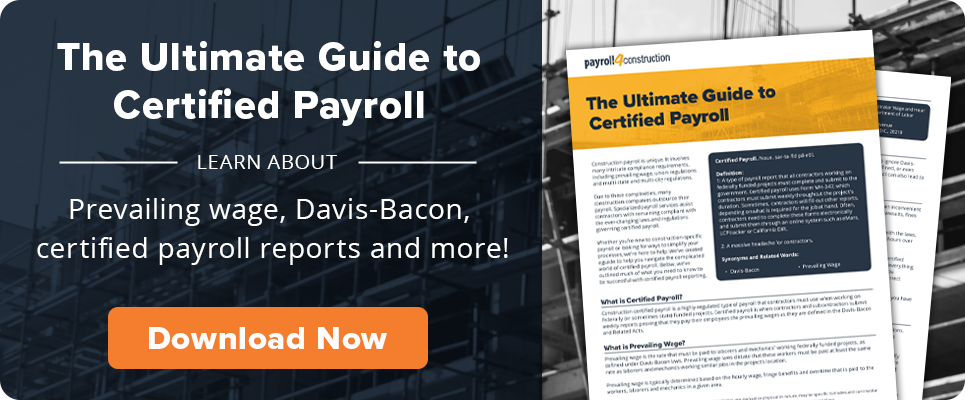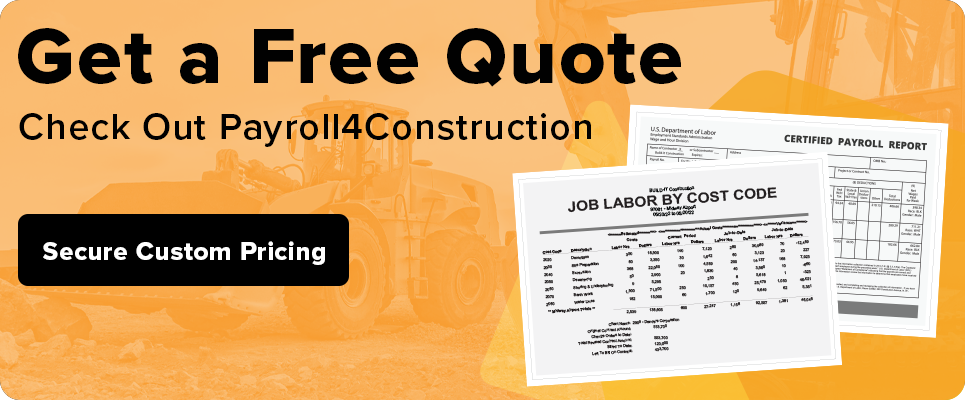Beyond Job Titles: The Critical Role of Trade Designations in Construction

August 19, 2024
Contractors are responsible for properly designating the trades of their workers when performing payroll.
Correctly designating trades for workers ensures they are paid an accurate wage and that employers remain compliant with the Department of Labor’s laws.
With that in mind, it’s important to understand:
- What trade designations are
- Common trade designations
- Why trade designations are important
- How to simplify trade designations
We created the guide below to give you a better understanding of trade designations and how they affect your construction company’s operations.
What Are Construction Trade Designations?
Trade designations are how employees are categorized based on their job duties. These designations determine wage rates, job requirements and regulatory compliance.
What Construction Trade Designations Are Available?
Typically, trade designations are the jobs that employees are hired to do, but in construction, an employee’s tasks may change depending on the job, so their titles may vary.
There are many trade designations in construction, some of which include:
- Carpenter
- Roofer
- Electrician
- Bricklayer
- Machine Operator
Properly designating workers is crucial to a construction company’s operations.
Why are the Trade Designations of Construction Workers Important?
There are four main reasons construction trade designations are important.
- Trade designations help determine the general wages for each worker. For example, electricians are paid differently than bricklayers.
- Employers and their insurers use trade designations to determine the level of risk associated with each role to establish workers’ compensation rates.
- Construction trade designations ensure that employees are paid fairly according to their specific roles and responsibilities. They also help employers keep track of employees working in various trades, whether at a single construction jobsite or across multiple locations.
- Construction trade designations make it easier to complete certified payroll reports, which are required during the payroll process.
- These reports ensure that workers are paid the correct prevailing wage based on their trade designation and location. Prevailing wages are the minimum amounts employees must be paid for their work on government projects in a specific area.
Construction trade designations also play an important role in calculating rates and fringe benefits for each employee.
How Do Construction Trade Designations Determine Fringe Benefits?
Prevailing wages are set by each state’s labor governing body, and they establish a standard pay rate for specific trades based on the location where the government work is performed.
There are a range of factors that can determine prevailing wages, including:
- Location
- Trade
- Experience or skill level
Certain construction trade designations may also offer specific fringe benefits — or benefits provided to a worker beyond their base salary or wage. Fringe benefits include:
- Health Insurance: Coverage for medical, dental, and vision care.
- Training and Development: Certifications, courses, and workshops related to a worker’s trade.
- Tool and Equipment Allowances: Stipends or reimbursements for purchasing or maintaining trade-specific tools and equipment.
Employers must note fringe benefits within the certified payroll report.
The goal of construction trade designations is to ensure workers are being paid the proper prevailing wages and receiving their fringe benefits throughout federal projects.
In other words, construction trade designations make sure workers are compensated fairly based on their qualifications and the tasks they are being asked to complete.
What Happens if Construction Trade Designations Are Incorrect?
Sometimes, employees work multiple roles across a few different jobsites within a pay period. This means they would have multiple trade designations with different pay rates.
As an employer grows, tracking each employee’s trade designation can be taxing and difficult to organize, which could cause errors like employee misclassification.
Construction trade designation mistakes can lead to delays and errors when processing payroll. And when there are payroll discrepancies, this evokes:
- An erosion of trust between workers and the construction owner or contractor — leads to a decrease in productivity and morale.
- A construction business receives a bad reputation, resulting in retention and recruiting problems.
- Financial penalties from government agencies.
- Risks of lawsuits because laborers are angry over their incorrect paychecks.
Construction trade designation errors can derail a contractor’s operation.
It’s important to identify solutions, such as construction payroll software or services, to precisely record accurate trade designations for each worker.
How Can Payroll Software Simplify Trade Designations?
With a leading construction payroll service provider, employers can:
- Process multiple rates for each employee on a single timecard
- Automatically generate certified payroll reports
- Avoid penalties from governing agencies
- Create good faith with workers to improve retention and recruiting efforts
- Integrate time tracking with their payroll to save time and more accurately track labor costs
Each of these features simplifies construction trade designations by automating wage calculations and allowing employers to identify inconsistencies before processing payroll.
How Does Payroll4Construction Reduce Trade Designation Errors?
Employers should look for a construction-specific payroll solution that can scale with their operations and simplify compliance items.
Payroll4Construction allows contractors to:
- Correctly classify their workers
- Automate payroll calculations
- Review calculations and trade designations before payroll is finalized
With Payroll4Construction, contractors compile accurate construction trade designations, which ultimately leads to precise construction payroll compliance items — including prevailing wage and fringe benefits.
Chat with a specialist today to learn how Payroll4Construction can handle your requirements.
Share Article
Keep on current news in the construction industry. Subscribe to free eNews!


